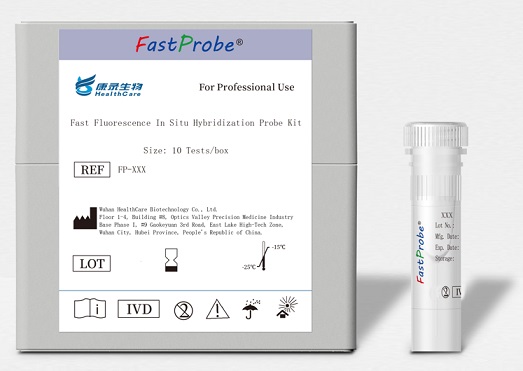IVD - FP354 KMT2A/MLLT4 Gene Fusion Probe Detection Kit

KMT2A/MLLT4 Gene Fusion Probe Detection Kit
[Overview]
Translocations involving the lysine (K)-specific methyltransferase 2A gene (KMT2A), previously known as mixed lineage leukemia (MLL), are frequently associated with acute lymphoid leukemia (ALL), acute myeloid leukemia (AML), and mixed-phenotype acute leukemia (MPAL)1. According to the World Health Organization (WHO) 2016 classification, leukemia with KMT2A rearrangements (KMT2A-r) is an independent subtype that often leads to a dismal prognosis, except for the intermediate prognostic factor t(9;11) involving KMT2A-MLLT3. KMT2A-chimeric genes that remain stable during clonal evolution of tumors can be used for molecular monitoring of minimal residual disease, which is a reliable predictor of clinical outcome. Accordingly, timely and accurate identification of KMT2A aberrations is of great clinical significance. To date, a total of 135 types of KMT2A-r have been identified, of which 94 translocation partner genes have been characterized at the molecular level4. In addition to the wide range of partner genes, the location of the KMT2A breakpoint varies within different chimeric genes. Therefore, confirmation of chromosomal rearrangements in KMT2A-associated acute leukemia (AL) remains a difficult diagnostic task owing to the high heterogeneity of the rearrangements. Translocations involving chromosome 11q23 frequently occur in both acute myeloid leukaemia (AML) and acute lymphoblastic leukaemia (ALL). In most cases, the MLL gene is involved but translocation partners are extremely variable. The most common MLL rearrangement in both AML and ALL involves fusion of the MLL and AFF1 (AF4) genes via a t(4;11)(q21;q23) translocation. Three of the other more common translocations involve the MLLT3 (AF9) gene on chromosome 9, the MLLT1 (ENL) gene on chromosome 19 or the MLLT4 (AF6) gene on chromosome 6.
[Download] KMT2A/MLLT4 Gene Fusion Probe Instructions
[Download MSDS] MSDS

